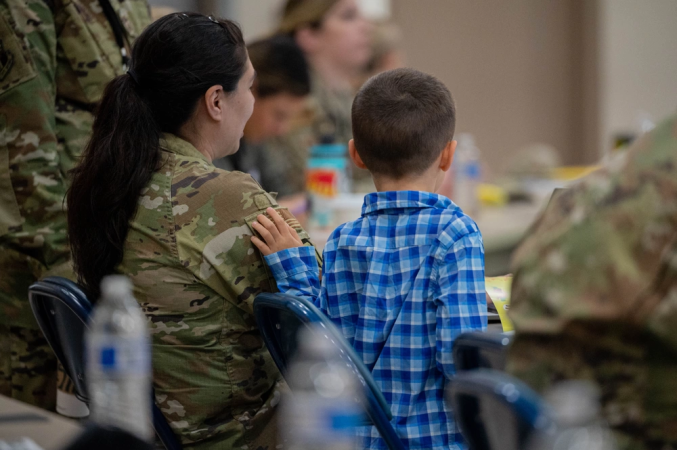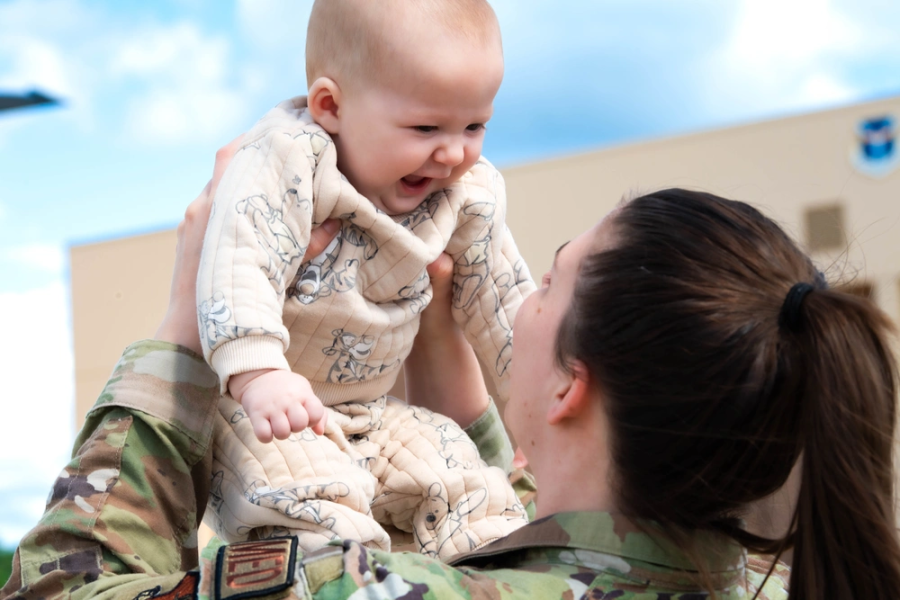Every drill weekend, Air Force Reservists across the country face the same problem: where to find child care for their kids. Amid a nationwide provider shortage, finding child care for drill weekends is even more difficult than during weekdays.
“Sometimes I’ve seen reservists bring their kids to work, which is not ideal,” Chief Master Sgt. Israel Nuñez, the senior enlisted leader for Air Force Reserve Command, told Air & Space Forces Magazine.
The Air Force runs a Home Community Care (HCC) program where individuals provide child care for Reservists and Air National Guardsmen on weekends, but those providers are often few and far between.
“If we wanted to drop our son off [with an HCC provider], we would have had to wake up at about 3:30, 4:00 in the morning to be able to leave the house on time, drop him off, and then get to work,” said 1st Lt. Marjorie Schurr, whose husband is also an Air Force Reservist. “That just wasn’t feasible, and we wouldn’t have gotten home until 6:30 at night.”
Schurr isn’t alone: a 2023 survey found 33.9 percent of Air Force Reservists rely on a spouse or partner to provide child care during drill weekends, 27.6 percent rely on parents or relatives, and 10 percent use private child care centers. One respondent said private child care cost almost $500 for two 12-hour days.
“That is my entire drill pay, not including the price of gas,” the survey respondent said. “I’m essentially working for free to be away from my baby, which is not fair to either of us.”
The cost, distance, and uncertainty of having to find trustworthy providers every drill weekend—formally known as Unit Training Assembly (UTA) weekends—is becoming a retention issue in the Reserve, which in the past few years has struggled with recruitment, Nuñez said.
“We want them to stay in for the long term, but if they’re having to pay to serve, they’re going to question their decision in the future if they want to reenlist or not,” he said.
New pilot programs at Pittsburgh Air Reserve Station, Pa., and Dobbins Air Reserve Base, Ga., may serve as a template for providing low-cost, accessible, and reliable child care for the rest of the Air Force Reserves, and possibly for Reserve components across the military.

Status Quo
Location is everything, and on the winding mountain roads surrounding Pittsburgh Air Reserve Station, a 15-mile drive can take 45 minutes or more round-trip. That made it difficult for Reservists there to use far-flung HCC providers on drill weekends, said Alex McConnell, military and family readiness program manager for the base’s 911th Airlift Wing.
HCC is successful in its own right: the program provided 97,501 hours of child care to 882 Air Force families for just $1 million in fiscal year 2023, according to a March press release. But Pittsburgh Reservists struggled with the long distances between locations, and they preferred having a central child care facility. Others feel the same way: nearly 500 of the 595 respondents to the 2023 survey recommended having a central facility open on drill weekends.
Another challenge with the HCC network is that HCC providers often have to split their attention between their own children and the service member’s. Nuñez and his wife, a fellow Reservist, experienced that during their years at Travis Air Force Base, Calif.
“It just wasn’t the individualized attention we thought that our six-month old really needed at that time,” he said.
Even when Reservists find an HCC provider who clicks with them, that provider may not be able to open their doors every month during drill weekend, or they might move away, forcing Reservists to start over with someone new.
The vast majority of Reserve wings are located on Active-Duty bases, which have full-time day care providers called Child Development Centers (CDC), Nuñez explained. But those CDCs usually are not open on weekends, and finding people to staff CDCs is already an issue across the military. If the Reserve wing wants the CDC to stay open, they may have to pay employees overtime to work weekends.
“Even if you open it up on the weekend, our Reservists have to pay that cost, which oftentimes, just working two days, your whole paycheck may be going to that child care,” he said.
Solutions
At Pittsburgh, the 911th Airlift Wing found a civilian provider close to the base that could stay open on weekends. Building trust between the provider and the families involved was a key part of the process.
“It’s really about building relationships,” starting with introducing the parents and the providers, McConnell said. The purpose was “to feel comfortable with letting them take care of the most valuable thing in our lives: our children.”
McConnell did not want to name the center for security and privacy reasons, but it’s already proven a big success, with about 20 families signed up since it opened in July. Schurr’s is one of them.
“The center we’re working with has been absolutely phenomenal,” she said. “They’ve been so caring and so patient, and they make it a point to send me pictures of my son throughout the day to show how he’s doing. And it is such a relief for me to know that he’s less than five minutes away from me should something happen.”
Before it opened, Schurr and her husband were not sure they could both make their goals of serving more than 20 years each. A prior enlisted Airman, Schurr has 12 years of experience while her husband has 18.
“I was very concerned that one of us would have to retire at 20 and say that our military career was done, just for the well-being of our family,” she said. “Now that this option is available, I know that we can stay in the military much longer, and our son is still taken care of and our family is still taken care of.”

Dobbins Air Reserve Base, Ga., found similar success after a former HCC provider opened her own child care center that caters to Reservists. It’s about a 25-minute drive from the base, but the feedback has been great so far, said Angela Pedersen, military and family readiness director for Dobbins’ 94th Airlift Wing.
“People don’t want to feel like they’re imposing on their family all the time,” she said. “This was kind of a relief for them.”
The new center opened up child care slots for 22 more children, Pedersen said. If those slots get filled, she thinks it could help convince other providers to open on weekends too. McConnell, the family readiness manager at Pittsburgh, made a similar point.
“For [the provider] to take the risk of opening on a weekend, without a 100 percent guarantee that they’re going to meet the minimum number of kids that they need to make a profit, that really was a leap of faith for them,” he said. “It turned out to be in everyone’s favor, that trust paid off, and they’re well above the threshold they need to be at to keep the doors open on a weekend.”
Both McConnell and Pedersen said their centers could serve as templates for other Air Force Reserve units to follow, as long as families trust the providers to take care of their kids, and as long as providers trust the families to consistently bring their kids to the center. Pedersen also suggested appealing to the provider’s sense of patriotism.
“Everybody’s all about patriotism and thanking our service members, and this is a way they can do that,” she said. “They’re not doing it for free, they are going to get paid. It’s just that the service needs to be in place.”
There is no silver bullet to providing child care for Reservists on weekends, Nuñez said. Instead, families need multiple options so they can choose the one which works best for them. Reserve units might consider working with the local Chamber of Commerce, KinderCare, or other organizations to create new solutions.
In the meantime, Nuñez said Congress could help by earmarking money to set up Reservist child care contracts with local providers. It could be modeled after the Reserve Health Readiness Program, where local health care providers are contracted to provide mandatory vaccines for troops far from a military treatment facility, for example.
“The doctors will come to your reserve unit, they will give you your shots, and that’s already covered by the contracted unit,” Nuñez explained. “If Congress were to write that into law and actually earmark money towards it, I think we could potentially get to a similar solution for child care. What that does is it incentivizes companies to contract with the federal government.”
The idea is to incentivize private child care companies to do what they don’t normally do: stay open on weekends. Pedersen floated another idea: making it easier for trusted friends of service members to become paid, certified providers through the HCC program.
“If there was a way to do that where the friend says, ‘OK, I’m not trying to be a daycare provider, but I will take this course so that I can keep my best friend’s child on UTA weekends,’ that would be great,” she said.
Since Reservist child care access is a military-wide problem, and each branch is trying out its own solutions, the Department of Defense should form an interservice reserve component working group to figure it out together, Nuñez said.
“We don’t go to war without a Reserve component,” he said, “so let’s take care of our Reservists as well.”
